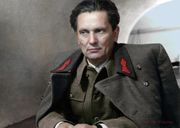Difference between revisions of "Kiet Narvga"
m |
m |
||
| Line 23: | Line 23: | ||
|majority2 = | |majority2 = | ||
|birth_name = Kiet Iosif Narvga | |birth_name = Kiet Iosif Narvga | ||
| − | |birth_date = {{birth date| | + | |birth_date = {{birth date|1927|1|3|df=yes}} |
|birth_place = Montza, [[Kormistazm|Principality of Kormistazm]], [[Great Morstaybishlia]] | |birth_place = Montza, [[Kormistazm|Principality of Kormistazm]], [[Great Morstaybishlia]] | ||
|death_date = | |death_date = | ||
Latest revision as of 17:58, 7 February 2020
| General Secretary Kiet Narvga | |
|---|---|

| |
| Narvga in 1970 at the beginning of the AIW | |
| General Secretary of the Republic of Norograd | |
| In office 2 March 1970 – September 1996 | |
| Preceded by | Office Established |
| Succeeded by | Office Disbanded |
| Personal details | |
| Born | Kiet Iosif Narvga 3 January 1927 Montza, Principality of Kormistazm, Great Morstaybishlia |
| Political party | Marxist-Noroist |
| Alma mater | Barque University, Barque |
Early Life
Kiet was Born on the third of January 1927 to a middle-class family in the Kormistazic Principality city of Montza. When he was 11 years old, paramilitary police raided his family home, killing his father who drew a sidearm when they broke down the door and arresting his mother who was found to be a member of a revolutionary communist force in the area associated with attacks on the government. Traumatised, Kiet was relocated to an orphanage for several months before he was adopted. He never really bonded with them though, and often spent extended periods away with friends during his later childhood.
University Life
He left his adoptive parents when he was 18 with a generous bursary to study at the renown Barque University. Soon into his first year, he joined a small communist fraternity, and became involved in the protest culture that was growing rapidly in the alienated Kormistazic youth. He was involved in numerous protests and events, and by his second year had gained the attention of the underground Noroist commune that the fraternity had connection to. Kiet was now involved in the organisation of protests, attacks on empirical police forces, and the dissemination of pro-communist newspapers and leaflets. Whilst the local police instantly suspected those pursuing degrees in politics as troublemakers, Kiet often escaped suspicion, allowing him more freedom than his comrades. His determination and drive led him up the chain of command, and by the end of his four year course at university, he was one of the lead organisers of the group. Without parents to deter him, he began focusing efforts into politics instead, eventually flunking the medical science degree he was pursuing.
Rise as revolutionary leader
After he left university, Keit left Barque for Andel, and became involved in the Norogradian Peoples Liberation Party, the largest underground communist group in Norograd. Armed with his experience in the commune and his fierce determination, Keit helped organise the ongoing undermining of empire rule in Norograd. He knew that armed revolution was the only way to {wip}
